Cooperation in Polygynous Households
 Polygynous husbands and wives cooperate less than monogamous ones and may contribute resources to the household with less altruistic motives, according to a paper in the April issue of the American Economic Journal: Applied Economics. Using a carefully designed series of public goods games, the authors of the article compared, across monogamous and polygynous households, the willingness of husbands and wives to cooperate to maximize household gains. Compared to monogamous husbands and wives, polygynous husbands and wives are less cooperative, one with another, and co-wives are least cooperative, one with another. The husbands' and wives' behaviour in a corresponding series of inter-household games indicates that these differences cannot be attributed to selection of less cooperative people into polygyny. Finally, behaviour in polygynous households is more reciprocal and less apparently altruistic.
Polygynous husbands and wives cooperate less than monogamous ones and may contribute resources to the household with less altruistic motives, according to a paper in the April issue of the American Economic Journal: Applied Economics. Using a carefully designed series of public goods games, the authors of the article compared, across monogamous and polygynous households, the willingness of husbands and wives to cooperate to maximize household gains. Compared to monogamous husbands and wives, polygynous husbands and wives are less cooperative, one with another, and co-wives are least cooperative, one with another. The husbands' and wives' behaviour in a corresponding series of inter-household games indicates that these differences cannot be attributed to selection of less cooperative people into polygyny. Finally, behaviour in polygynous households is more reciprocal and less apparently altruistic.
Read the article (journal subscribers' access).
This article appeared in American Economic Journal: Applied Economics. Vol. 11, No. 2, April 2019 (Pp. 266-83).
The article featured as 'Chart of the Week' of the American Economic Association
Author(s) / editor(s)
About the author(s) / editor(s)

Marleen Dekker (ASCL) is Professor of Inclusive Development in Africa at Leiden University. She is trained as a human geographer and holds a PhD in Development Economics.

